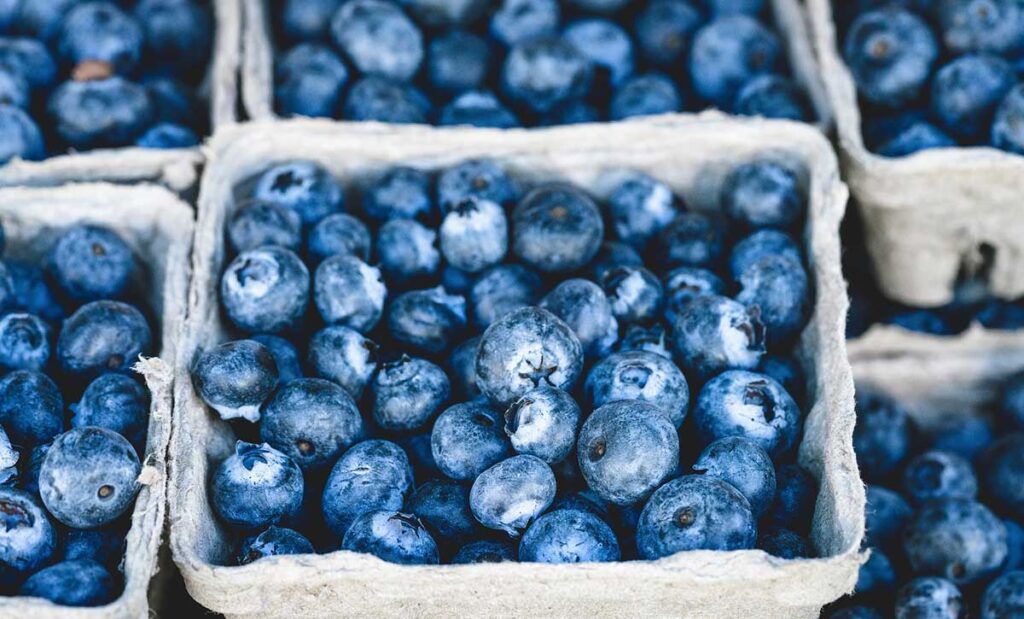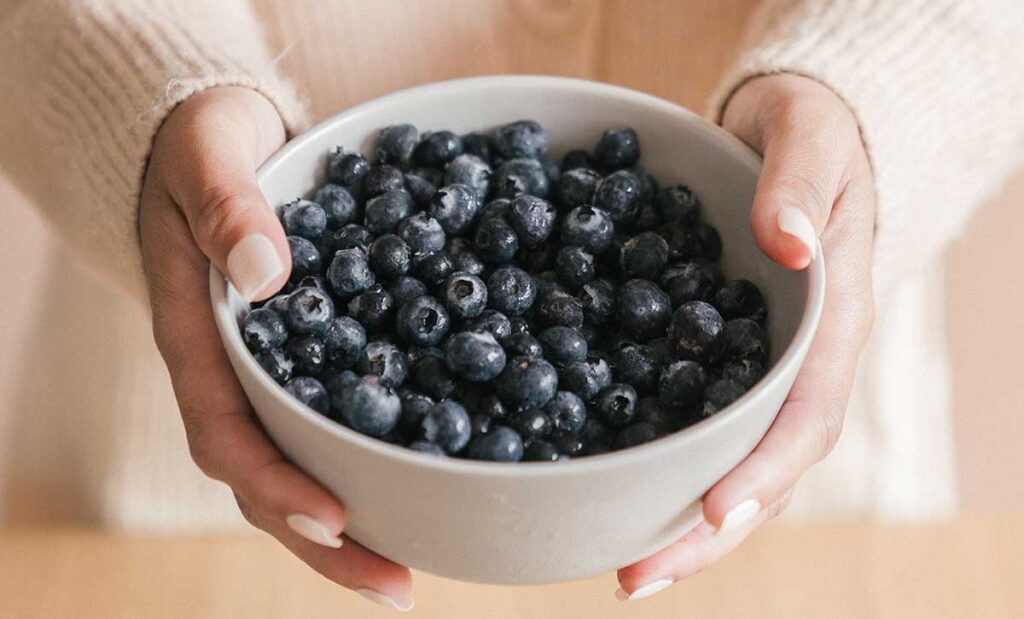Last Updated on November 13, 2023 by Cathy

What are the benefits of eating blueberries? Blueberry consumption has more than tripled since the mid-2000s. And for good reason, they’re easy to eat, delicious, and they are extremely healthy. Especially for people with multiple sclerosis (MS).
Blueberries are a native fruit of North America. They are rich in antioxidants, which help to prevent and repair cell damage. And they are beneficial for brain health.
Health Benefits of Blueberries
Blueberries are rich in antioxidants and anthocyanins. They improve cognitive function and protect against age-related cognitive decline.
Blueberries are a nutritious fruit that offers a wide range of health benefits. Here are some of the benefits of eating blueberries:
- High in antioxidants. They help protect the body against damage from free radicals.
- Supports brain health. Eating blueberries improves cognitive function and memory.
- Reduces inflammation. The anti-inflammatory properties of blueberries may help reduce the risk of chronic diseases.
- Lowers blood pressure. Consuming blueberries helps lower blood pressure, which can lead to heart disease. People with MS have a higher risk of heart disease.
- Improves gut health. Blueberries are a good source of fiber, which promotes a healthy gut.
- Improves insulin sensitivity. Consuming blueberries helps manage blood sugar levels.
- Low in calories. Blueberries are low in calories and high in fiber. This makes them a great choice for people looking to manage their weight.
Overall, blueberries are a nutritious and delicious fruit. They also offer a range of health benefits. Especially for people with MS.
Cultivated Blueberries vs Wild Blueberries

Cultivated blueberries and wild blueberries are two different types of blueberries. There are differences in appearance, taste, and nutritional content. Wild blueberries have two times more antioxidants than cultivated blueberries.
In recent years there’s been an alarming rise in pesticide residues in blueberries. 90% of non-organic blueberries tested positive for pesticide residues. A single sample contained 17 different pesticides. Wild blueberries contain zero pesticides.
The Power of Antioxidants
Antioxidants are molecules that protect cells from damage caused by free radicals. Antioxidants neutralize free radicals preventing damage to cells. Oxidative stress, which researchers have linked to MS, results from free radicals.
Blueberries are also a good source of fiber, vitamin C, vitamin K, and manganese. Try adding wild blueberries to your diet every day.
Wild blueberries grow in many regions including North America, Europe, and Asia. In North America, wild blueberries are primarily found in Maine, United States. They also grow in eastern Canada, particularly in Quebec, and New Brunswick.
- Appearance. Cultivated blueberries are typically larger and plumper than wild blueberries. They also have a slightly lighter color. Wild blueberries are smaller, darker, and have a more intense blue color.
- Taste. Cultivated blueberries tend to be sweeter and milder in flavor. Wild blueberries have a more intense, tart flavor.
- Nutritional content. Wild blueberries have a higher concentration of antioxidants, particularly anthocyanins, than cultivated blueberries. They also tend to have higher levels of other beneficial compounds. Such as flavonoids and polyphenols.
- Availability. Cultivated blueberries are more widely available and easier to find in grocery stores. Wild blueberries are typically smaller in size and grow in more remote areas. This makes them harder to cultivate and harvest on a large scale.
Both types of blueberries are nutritious and offer a range of health benefits. But wild blueberries may have more antioxidants and nutrient content.
Avoid conventionally grown non-organic blueberries. They are high in pesticides which have heavy metals. Heavy metals are a co-factor in the onset of MS.
To learn more about pesticides read How The 2023 Dirty Dozen Affects You
Benefits of Blueberries for People with MS

Exposure to certain pesticides can damage the central nervous system (CNS). Studies found a link between pesticide exposure and an increased risk of MS. Agricultural workers had a significantly higher risk of developing MS.
MS is a chronic autoimmune disease that affects the CNS. Some research found eating blueberries offers benefits for people with MS. To avoid pesticides it’s best to eat organic blueberries. Wild blueberries are even better than cultivated organic blueberries.
Here are some benefits for people with MS:
- Anti-inflammatory properties. Blueberries are rich in anti-inflammatory compounds. They help reduce inflammation in the body and alleviate some of the symptoms of MS.
- Brain health. Studies suggest that eating blueberries improve cognitive function and memory. This is particularly important for those who experience cognitive impairment.
- Gut health. Blueberries are a good source of fiber, which promotes the growth of a healthy gut. Researchers found people with MS have more bad gut bacteria than healthy people.
- Antioxidants. Blueberries help protect the body against damage from free radicals. Oxidative stress plays a role in the development and progression of the condition.
Eating blueberries supports your brain and overall health.
The most powerful brain food

There is no single food that is the “most powerful” for the brain. Eating a variety of food supplies different nutrients to help the body heal.
Here are some foods that are particularly beneficial for the brain:
- Fatty fish. Fatty fish, such as salmon, are rich in omega-3 fatty acids. These are essential for brain health and cognitive function.*
- Blueberries. Blueberries are rich in antioxidants. This improves cognitive function.
- Nuts and seeds. Nuts and seeds, such as almonds, walnuts, and pumpkin seeds, are good sources of vitamin E.
- Leafy greens. Leafy greens, such as spinach and kale, are rich in vitamins and minerals. They are essential for brain health, including folate, vitamin K, and vitamin C.
*If you are avoiding meat here is a fish oil alternative supplement: Vimergy Vegan EPA/DHA
Where to buy wild blueberries?

You can find wild blueberries in the freezer section of many grocery stores. Amazon also sells wild blueberries in different forms such as:
I buy frozen wild blueberries from local stores such as Costco. You can use wild blueberries in a variety of recipes. Including smoothies, jams, pies, and muffins. Check out this delicious and easy wild blueberry smoothie recipe:
Wild blueberry smoothie:
- 1 – banana
- 1 – apple, cored and chopped
- 1 cup of wild blueberries
- 1 cup of filtered water
Add to a blender and mix until smooth. Serves one.
Wild Blueberries
Eating wild blueberries is essential while healing from MS. Eat them every day whether it’s in a smoothie, another recipe, or by themselves. If you can’t find wild blueberries make sure you purchase organic blueberries. Cultivated non-organic blueberries have high pesticide residues.

Free Wellness Library!
Subscribe for free and I’ll send you the password to my secret library filled with many printables for your wellness journey.
Want to remember this health tip? Pin it to your Pinterest board!

Images from aleksandarlittlewolf and Holiak on Freepik, Mike Jones by Pexels, and Alexandr and Beth Thomas from Pixabay.
Resources:
https://www.ers.usda.gov/data-products/chart-gallery/gallery/chart-detail/?chartId=93270
https://pubmed.ncbi.nlm.nih.gov/22243431/
https://pubmed.ncbi.nlm.nih.gov/36066009/
Power up Against MS with Wild Blueberries





